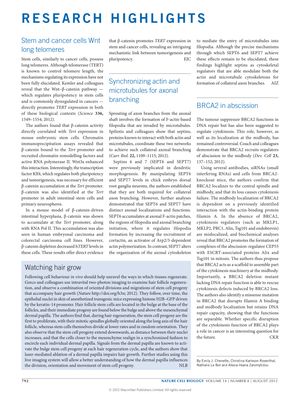Stem and Cancer Cells Wnt Long Telomeres
August 2012
in “
Nature Cell Biology
”
Wnt-ß-catenin pathway telomerase TERT ß-catenin mouse embryonic stem cells chromatin remodeling factors RNA polymerase II adult intestinal stem cells primary neurospheres intestinal hyperplasia human embryonal carcinoma colorectal carcinoma hTERT Wnt-beta-catenin pathway beta-catenin stem cells chromatin remodeling RNA polymerase intestinal stem cells neurospheres embryonal carcinoma colorectal cancer

TLDR A pathway helps maintain long telomeres in both stem and cancer cells.
The document reports that the Wnt-ß-catenin pathway, which is involved in regulating pluripotency in stem cells and is often dysregulated in cancers, directly promotes the expression of telomerase (TERT) in both stem and cancer cells. The study by Kemler and colleagues, published in Science, found that ß-catenin activity is directly correlated with Tert expression in mouse embryonic stem cells and that ß-catenin binds to the Tert promoter, enhancing its interaction with chromatin remodeling factors and active RNA polymerase II. This mechanism was also observed in adult intestinal stem cells, primary neurospheres, and in a mouse model of ß-catenin-driven intestinal hyperplasia, as well as in human embryonal carcinoma and colorectal carcinoma cell lines. Depletion of ß-catenin resulted in decreased hTERT levels, suggesting a crucial role of ß-catenin in maintaining long telomeres in these cells. This finding provides a mechanistic link between tumorigenesis and pluripotency.
